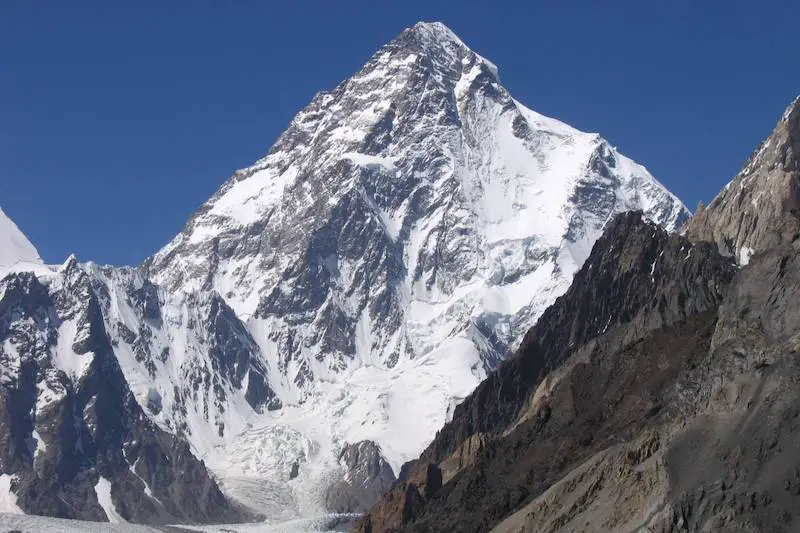It hasn’t even been a month since the dust settled on the controversial and difficult climbing season in the Himalaya and already we’re turning our attention to Pakistan and the Karakoram. Even now, the first teams are making their way into K2 Base Camp as operations there in Pakistan begin to ramp up. And while the 8000-meter peaks found inside that country will be busy this summer, they won’t be nearly as crowded as Everest, thanks in part to how remote and challenging they can be.
According to Alan Arnette, more than 400 climbing permits have been issued for the summer season in Pakistan this year. Of those, roughly 160 were give out for climbers who will be attempting K2, the world’s second highest peak at 8611 meters (28,251 ft). That’s a far cry from the 1100+ permits that were issued for Everest when you add up both the North and South Sides of that mountain. That said, the commercial business surrounding K2 continues to grow each year and 2019 looks to continue that trend.
The largest operator on the mountain these days is Seven Summit Treks, who is bringing a team of more than 40 climbers and support crew to Base Camp this summer. Madison Mountaineering will also be there, although their numbers are more modest. A recent update indicates that the team flew to Skardu and drove to Askole, the starting point for the true journey to K2. Soon, they’ll begin the trekking leg which takes the better part of ten days to complete is a real challenge in and of itself.
In addition to the growing number of commercial and independent teams on K2 this summer, there will be a few notable alpinists there as well. For instance, Swiss explorer Mike Horn is back for another go. He attempted the mountain back in 2015, driving all the way from his home to Pakistan in the process. While that was a good exploratory and adventurous mission, he didn’t truly take a crack at the summit. This year he looks poised to give it more of a go, which is evident by the fact that he is already in Base Camp well ahead of the other teams.
Also on K2 this summer is Adrian Ballinger of Alpenglow Expeditions. Not only will the organization be leading a team, but Adrian will be attempting K2 without supplemental oxygen. He pulled off the same feat on Everest a few years back and now looks to add another 8000-meter mountain to his no-Os resume. Considering how difficult the Big Hill was, K2 promises to be quite a challenge as well.
Of course, there are plenty of expeditions heading to other Pakistani peaks this summer as well. For instance, a number of teams, such as Furtenbach Adventures, will warm-up on Broad Peak (8051 m/26,414 ft) before heading to K2. That’s become a popular strategy for those looking to acclimatize on a big mountain that is a bit less dangerous. BP is still a challenging climb however, so few alpinists actually pull off the doubleheader of summiting both it and K2 in the same season.
There will be a few climbers heading to Nanga Parbat (8126 m/26,660 ft) as well, although that mountain has seen fewer expeditions since the 2013 season. That’s when members of the Taliban attacked Base Camp, killing 11 people there. The place has been stable and there is an armed military presence in the region these days to prevent such an incident from occurring again, but the number of teams that now go to Nanga has decreased over the years. Still, Alan Arnette is reporting that Russian climbers Vitaly Lazo and Anton Pugovkin want to not only summit the mountain but also ski the Diamir Face.
Nirmal “Nims” Purja is presumably heading to K2 Base Camp this summer as well. After knocking off six 8000-meter peaks this past spring, he’s now setting his sights on climbing the world’s second highest peak, along with Broad Peak, Nanga Parbat, and both Gasherbrum 1 and 2 over the next month and a half or so. Purja was experiencing some financial challenges to funding his expedition, but he appears to be pressing ahead with Phase 2 of Project Possible 14/7, his attempt at climbing all 14 8000-meter mountains over the span of 7 months.
As of today, most of the teams and climbers are just now starting to make their way towards their respective mountains. Some haven’t even arrived in Pakistan as of yet. Of course, we’ll be watching their progress closely in the weeks ahead, so look for regular updates throughout the summer as things continue to unfold in the Karakoram. It should be another interesting season indeed.
- Gear Review: The Xero Scrambler Mid is an Ultralight Hiking Shoe for Spring - March 1, 2023
- Gear Review: Yeti Roadie 48 Wheeled Cooler - August 18, 2022
- Kristin Harila Continues Pursuit of 8000-Meter Speed Record - August 16, 2022
